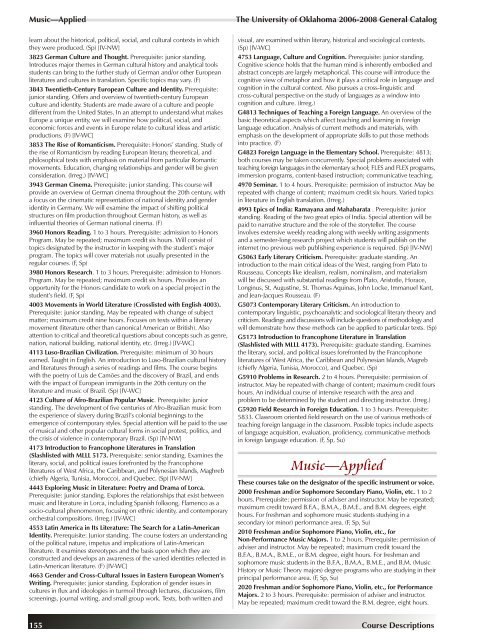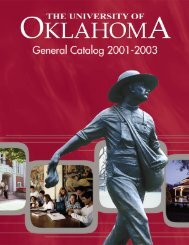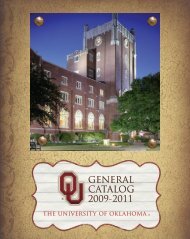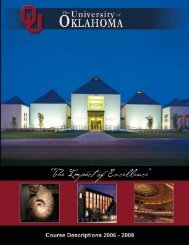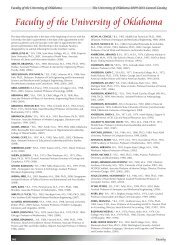ART - Catalog - University of Oklahoma
ART - Catalog - University of Oklahoma
ART - Catalog - University of Oklahoma
You also want an ePaper? Increase the reach of your titles
YUMPU automatically turns print PDFs into web optimized ePapers that Google loves.
Music—Applied<br />
The Uni ver sity <strong>of</strong> <strong>Oklahoma</strong> 2006-2008 Gen eral Cat a log<br />
learn about the historical, political, social, and cultural contexts in which<br />
they were produced. (Sp) [IV-NW]<br />
3823 German Culture and Thought. Prerequisite: junior standing.<br />
Introduces major themes in German cultural history and analytical tools<br />
students can bring to the further study <strong>of</strong> German and/or other European<br />
literatures and cultures in translation. Specific topics may vary. (F)<br />
3843 Twentieth-Century European Culture and Identity. Prerequisite:<br />
junior standing. Offers and overview <strong>of</strong> twentieth-century European<br />
culture and identity. Students are made aware <strong>of</strong> a culture and people<br />
different from the United States. In an attempt to understand what makes<br />
Europe a unique entity, we will examine how political, social, and<br />
economic forces and events in Europe relate to cultural ideas and artistic<br />
productions. (F) [IV-WC]<br />
3853 The Rise <strong>of</strong> Romanticism. Prerequisite: Honors’ standing. Study <strong>of</strong><br />
the rise <strong>of</strong> Romanticism by reading European literary, theoretical, and<br />
philosophical texts with emphasis on material from particular Romantic<br />
movements. Education, changing relationships and gender will be given<br />
consideration. (Irreg.) [IV-WC]<br />
3943 German Cinema. Prerequisite: junior standing. This course will<br />
provide an overview <strong>of</strong> German cinema throughout the 20th century, with<br />
a focus on the cinematic representation <strong>of</strong> national identity and gender<br />
identity in Germany. We will examine the impact <strong>of</strong> shifting political<br />
structures on film production throughout German history, as well as<br />
influential theories <strong>of</strong> German national cinema. (F)<br />
3960 Honors Reading. 1 to 3 hours. Prerequisite: admission to Honors<br />
Program. May be repeated; maximum credit six hours. Will consist <strong>of</strong><br />
topics designated by the instructor in keeping with the student’s major<br />
program. The topics will cover materials not usually presented in the<br />
regular courses. (F, Sp)<br />
3980 Honors Research. 1 to 3 hours. Prerequisite: admission to Honors<br />
Program. May be repeated; maximum credit six hours. Provides an<br />
opportunity for the Honors candidate to work on a special project in the<br />
student’s field. (F, Sp)<br />
4003 Movements in World Literature (Crosslisted with English 4003).<br />
Prerequisite: junior standing. May be repeated with change <strong>of</strong> subject<br />
matter; maximum credit nine hours. Focuses on texts within a literary<br />
movement (literature other than canonical American or British). Also<br />
attention to critical and theoretical questions about concepts such as genre,<br />
nation, national building, national identity, etc. (Irreg.) [IV-WC]<br />
4113 Luso-Brazilian Civilization. Prerequisite: minimum <strong>of</strong> 30 hours<br />
earned. Taught in English. An introduction to Luso-Brazilian cultural history<br />
and literatures through a series <strong>of</strong> readings and films. The course begins<br />
with the poetry <strong>of</strong> Luis de Camões and the discovery <strong>of</strong> Brazil, and ends<br />
with the impact <strong>of</strong> European immigrants in the 20th century on the<br />
literature and music <strong>of</strong> Brazil. (Sp) [IV-WC]<br />
4123 Culture <strong>of</strong> Afro-Brazilian Popular Music. Prerequisite: junior<br />
standing. The development <strong>of</strong> five centuries <strong>of</strong> Afro-Brazilian music from<br />
the experience <strong>of</strong> slavery during Brazil’s colonial beginnings to the<br />
emergence <strong>of</strong> contemporary styles. Special attention will be paid to the use<br />
<strong>of</strong> musical and other popular cultural forms in social protest, politics, and<br />
the crisis <strong>of</strong> violence in contemporary Brazil. (Sp) [IV-NW]<br />
4173 Introduction to Francophone Literatures in Translation<br />
(Slashlisted with MLLL 5173. Prerequisite: senior standing. Examines the<br />
literary, social, and political issues forefronted by the Francophone<br />
literatures <strong>of</strong> West Africa, the Caribbean, and Polynesian Islands, Maghreb<br />
(chiefly Algeria, Tunisia, Morocco), and Quebec. (Sp) [IV-NW]<br />
4443 Exploring Music in Literature: Poetry and Drama <strong>of</strong> Lorca.<br />
Prerequisite: junior standing. Explores the relationships that exist between<br />
music and literature in Lorca, including Spanish folksong, Flamenco as a<br />
socio-cultural phenomenon, focusing on ethnic identity, and contemporary<br />
orchestral compositions. (Irreg.) [IV-WC]<br />
4553 Latin America in Its Literature: The Search for a Latin-American<br />
Identity. Prerequisite: Junior standing. The course fosters an understanding<br />
<strong>of</strong> the political nature, impetus and implications <strong>of</strong> Latin-American<br />
literature. It examines stereotypes and the basis upon which they are<br />
constructed and develops an awareness <strong>of</strong> the varied identities reflected in<br />
Latin-American literature. (F) [IV-WC]<br />
4663 Gender and Cross-Cultural Issues in Eastern European Women’s<br />
Writing. Prerequisite: junior standing. Exploration <strong>of</strong> gender issues in<br />
cultures in flux and ideologies in turmoil through lectures, discussions, film<br />
screenings, journal writing, and small group work. Texts, both written and<br />
visual, are examined within literary, historical and sociological contexts.<br />
(Sp) [IV-WC]<br />
4753 Language, Culture and Cognition. Prerequisite: junior standing.<br />
Cognitive science holds that the human mind is inherently embodied and<br />
abstract concepts are largely metaphorical. This course will introduce the<br />
cognitive view <strong>of</strong> metaphor and how it plays a critical role in language and<br />
cognition in the cultural context. Also pursues a cross-linguistic and<br />
cross-cultural perspective on the study <strong>of</strong> languages as a window into<br />
cognition and culture. (Irreg.)<br />
G4813 Techniques <strong>of</strong> Teaching a Foreign Language. An overview <strong>of</strong> the<br />
basic theoretical aspects which affect teaching and learning in foreign<br />
language education. Analysis <strong>of</strong> current methods and materials, with<br />
emphasis on the development <strong>of</strong> appropriate skills to put those methods<br />
into practice. (F)<br />
G4823 Foreign Language in the Elementary School. Prerequisite: 4813;<br />
both courses may be taken concurrently. Special problems associated with<br />
teaching foreign languages in the elementary school; FLES and FLEX programs,<br />
immersion programs, content-based instruction; communicative teaching.<br />
4970 Seminar. 1 to 4 hours. Prerequisite: permission <strong>of</strong> instructor. May be<br />
repeated with change <strong>of</strong> content; maximum credit six hours. Varied topics<br />
in literature in English translation. (Irreg.)<br />
4993 Epics <strong>of</strong> India: Ramayana and Mahabarata . Prerequisite: junior<br />
standing. Reading <strong>of</strong> the two great epics <strong>of</strong> India. Special attention will be<br />
paid to narrative structure and the role <strong>of</strong> the storyteller. The course<br />
involves extensive weekly reading along with weekly writing assignments<br />
and a semester-long research project which students will publish on the<br />
internet (no previous web publishing experience is required. (Sp) [IV-NW]<br />
G5063 Early Literary Criticism. Prerequisite: graduate standing. An<br />
introduction to the main critical ideas <strong>of</strong> the West, ranging from Plato to<br />
Rousseau. Concepts like idealism, realism, nominalism, and materialism<br />
will be discussed with substantial readings from Plato, Aristotle, Horace,<br />
Longinus, St. Augustine, St. Thomas Aquinas, John Locke, Immanuel Kant,<br />
and Jean-Jacques Rousseau. (F)<br />
G5073 Contemporary Literary Criticism. An introduction to<br />
contemporary linguistic, psychoanalytic and sociological literary theory and<br />
criticism. Readings and discussions will include questions <strong>of</strong> methodology and<br />
will demonstrate how these methods can be applied to particular texts. (Sp)<br />
G5173 Introduction to Francophone Literature in Translation<br />
(Slashlisted with MLLL 4173). Prerequisite: graduate standing. Examines<br />
the literary, social, and political issues forefronted by the Francophone<br />
literatures <strong>of</strong> West Africa, the Caribbean and Polynesian Islands, Magreb<br />
(chiefly Algeria, Tunisia, Morocco), and Quebec. (Sp)<br />
G5910 Problems in Research. 2 to 4 hours. Prerequisite: permission <strong>of</strong><br />
instructor. May be repeated with change <strong>of</strong> content; maximum credit fours<br />
hours. An individual course <strong>of</strong> intensive research with the area and<br />
problem to be determined by the student and directing instructor. (Irreg.)<br />
G5920 Field Research in Foreign Education. 1 to 3 hours. Prerequisite:<br />
5833. Classroom oriented field research on the use <strong>of</strong> various methods <strong>of</strong><br />
teaching foreign language in the classroom. Possible topics include aspects<br />
<strong>of</strong> language acquisition, evaluation, pr<strong>of</strong>iciency, communicative methods<br />
in foreign language education. (F, Sp, Su)<br />
Music—Applied<br />
These courses take on the designator <strong>of</strong> the specific instrument or voice.<br />
2000 Freshman and/or Sophomore Secondary Piano, Violin, etc. 1 to 2<br />
hours. Prerequisite: permission <strong>of</strong> adviser and instructor. May be repeated;<br />
maximum credit toward B.F.A., B.M.A., B.M.E., and B.M. degrees, eight<br />
hours. For freshman and sophomore music students studying in a<br />
secondary (or minor) performance area. (F, Sp, Su)<br />
2010 Freshman and/or Sophomore Piano, Violin, etc., for<br />
Non-Performance Music Majors. 1 to 2 hours. Prerequisite: permission <strong>of</strong><br />
adviser and instructor. May be repeated; maximum credit toward the<br />
B.F.A., B.M.A., B.M.E., or B.M. degree, eight hours. For freshman and<br />
sophomore music students in the B.F.A., B.M.A., B.M.E., and B.M. (Music<br />
History or Music Theory majors) degree programs who are studying in their<br />
principal performance area. (F, Sp, Su)<br />
2020 Freshman and/or Sophomore Piano, Violin, etc., for Performance<br />
Majors. 2 to 3 hours. Prerequisite: permission <strong>of</strong> adviser and instructor.<br />
May be repeated; maximum credit toward the B.M. degree, eight hours.<br />
155 Course Descriptions


